Key takeaways:
- Ethical decision-making in recovery requires balancing immediate relief with long-term rehabilitation, emphasizing the importance of empathy and community engagement.
- Key principles include transparency, fairness, and accountability, which foster trust and align decisions with community needs.
- Challenges arise from the pressure for swift action, conflicting values, and the emotional toll of decisions, highlighting the complexity of ethical choices.
- Strategies for ethical decision-making involve stakeholder analysis, establishing an ethical framework, and reflective practice to enhance understanding and growth.
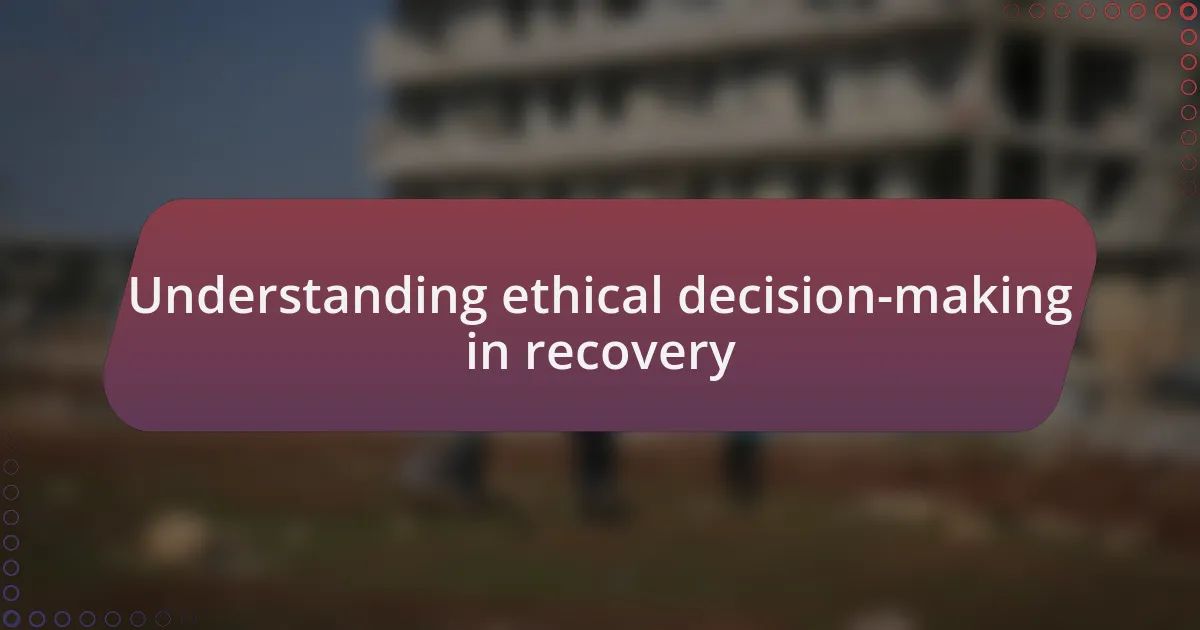
Understanding ethical decision-making in recovery
Ethical decision-making in recovery involves navigating complex emotions and dilemmas that often arise in post-conflict situations. I remember a time when I had to choose between prioritizing resources for immediate relief or investing in long-term rehabilitation programs. It struck me then how such choices carry not just logistical implications, but also moral weight, shaping the future of impacted communities.
It’s fascinating to consider how our values inform our decisions during recovery efforts. Have you ever found yourself questioning what is truly right or wrong in a chaotic environment? I certainly have. I felt torn between helping individuals in immediate distress and fostering collective growth. This personal struggle highlighted the importance of empathy in ethical decision-making; understanding the broader implications of each action can lead to more humane outcomes.
Moreover, recognizing the diverse perspectives of those affected by conflict is crucial. In my experience, engaging with local communities reveals stories and insights that can profoundly influence ethical choices. Listening to their voices matters; it transforms our decisions from mere strategies into meaningful pathways towards healing and restoration.
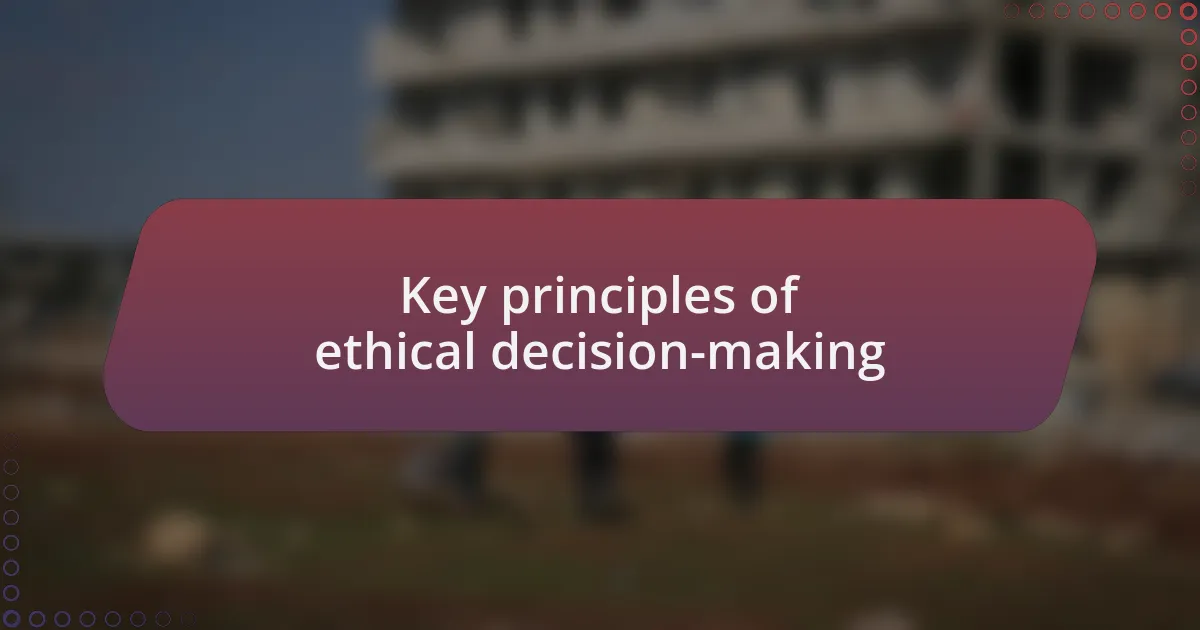
Key principles of ethical decision-making
One key principle of ethical decision-making is the commitment to transparency. I recall a project where we had to explain our funding decisions to a community that was anxious about resource allocation. It was both daunting and illuminating to open up discussions, allowing their questions and concerns to shape our plans. This openness not only built trust but also ensured that our choices aligned with the community’s true needs.
Another significant principle is the consideration of fairness. In a post-conflict context, I found myself grappling with how to allocate support among different groups vying for attention. It was a tightrope walk, balancing compassion with equity. I often had to pause and reflect: were we genuinely addressing the needs of the most vulnerable, or were we inadvertently favoring the loudest voices?
Lastly, the principle of accountability stands out. There was a moment when I realized that acknowledging mistakes is as crucial as celebrating successes. I remember a community leader confronting us about a mismanaged program. Instead of being defensive, I chose to engage in dialogue. That experience highlighted that accepting responsibility fosters a culture of improvement and deeper connection with those we aim to serve. Wouldn’t you agree that owning up to our past choices can lead to a more sustainable future?
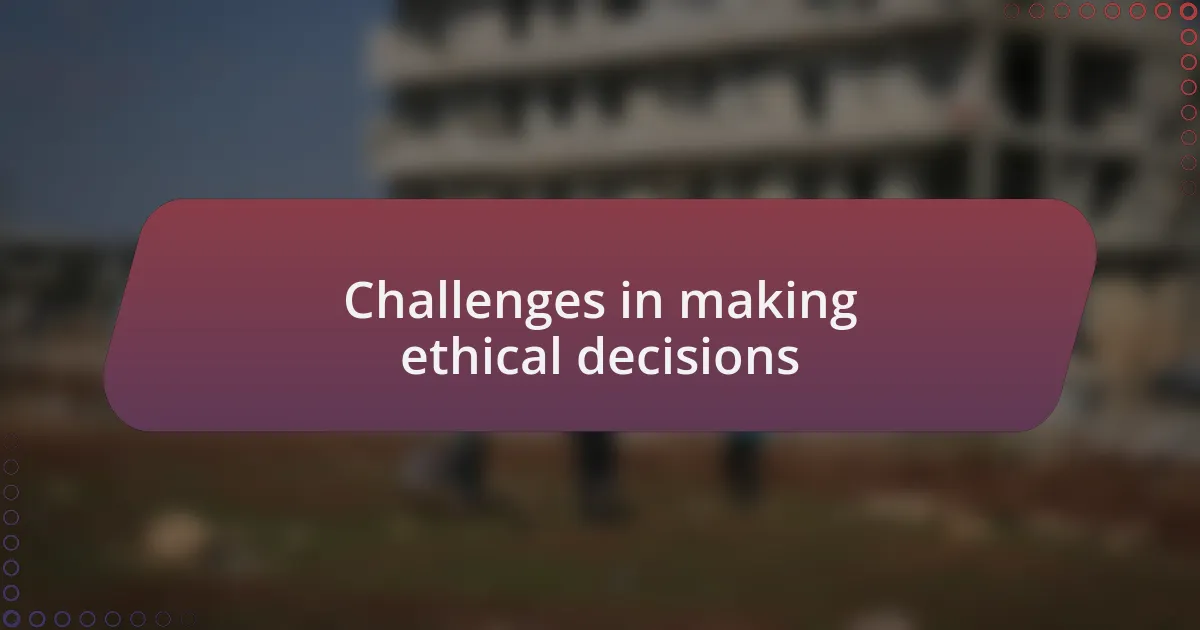
Challenges in making ethical decisions
One of the key challenges in making ethical decisions is the pressure to act quickly, especially in post-conflict environments. I remember a situation where I was urged to implement a program immediately to provide relief. However, the urgency clashed with the need for thorough assessment. It made me question: how do we ensure that speed does not compromise our ethical standards? This tension often leaves decision-makers feeling stranded between immediate needs and long-term impacts.
Another barrier is the complexity of conflicting values. In my experience, I encountered scenarios where cultural norms conflicted with human rights principles. It was a disheartening realization that what seemed ethical in one context could be viewed as unjust in another. How do we navigate these turbulent waters without losing sight of our core values? I often found myself engaging with community members over coffee, grappling with these dilemmas. Those conversations were enlightening yet overwhelming, reminding me that the path to ethical choices is rarely straight.
Additionally, I cannot overlook the emotional toll these decisions can take on us as individuals. I distinctly recall feeling a heavy weight when tasked with determining which families to prioritize for assistance. There were nights when I wrestled with guilt, wondering if I could live with my decisions. This internal conflict underscores the reality that ethical decision-making is as much about our emotional responses as it is about reasoned arguments. Have you ever felt that sense of responsibility weighing on you? It’s that very struggle that shapes us into more thoughtful decision-makers.
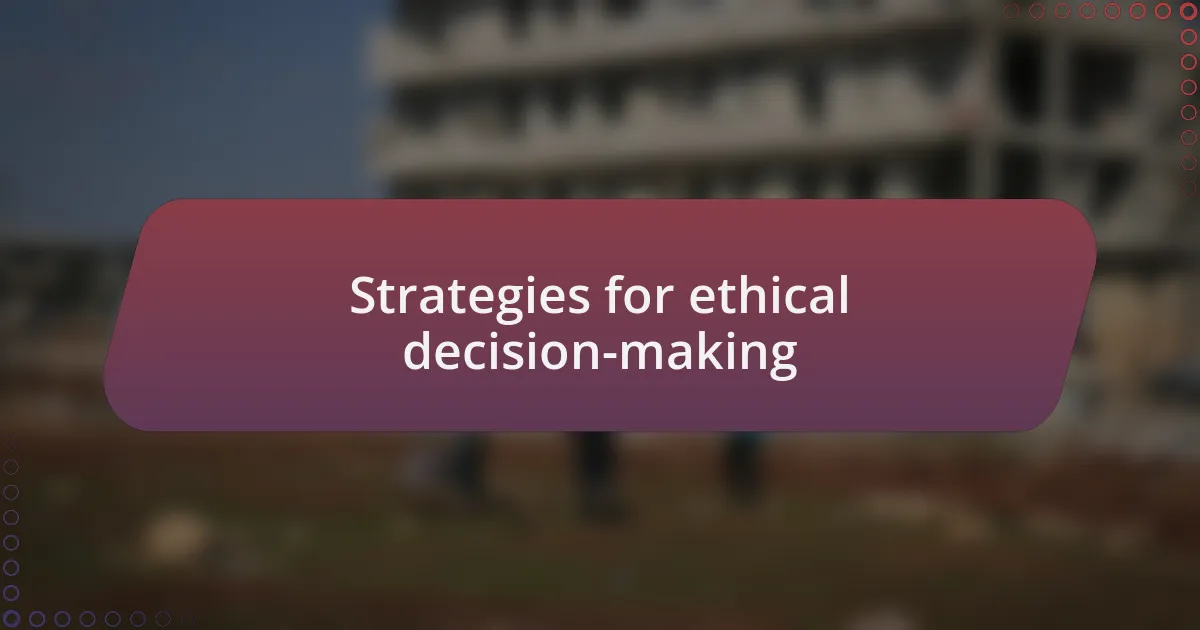
Strategies for ethical decision-making
One strategy I’ve found invaluable in ethical decision-making is employing a stakeholder analysis. This involves mapping out all the parties affected by a decision and considering their perspectives. I once facilitated a workshop where we dissected community needs versus organizational goals. It was eye-opening to see how varying viewpoints could complicate a straightforward decision; engaging directly with stakeholders transformed my understanding of what truly mattered.
Another approach is to establish a clear ethical framework to guide choices. For instance, I created a simple checklist based on core values such as transparency, fairness, and accountability. During a particularly challenging negotiation with local leaders, I leaned on this framework to ensure that my decisions aligned with my principles. Honestly, having a go-to set of guidelines made a world of difference in maintaining my focus when emotions ran high.
Lastly, I believe in the importance of reflective practice. Taking time to revisit past decisions, analyzing both successes and failures, can be incredibly enlightening. I remember a project that didn’t go as planned, and instead of shunning it, I gathered my team to discuss what we learned. This practice not only fosters deeper insights but also cultivates a culture of openness, which is crucial for ethical decision-making. Have you sat down to reflect on your choices lately? It might just lead you to a more thoughtful approach.
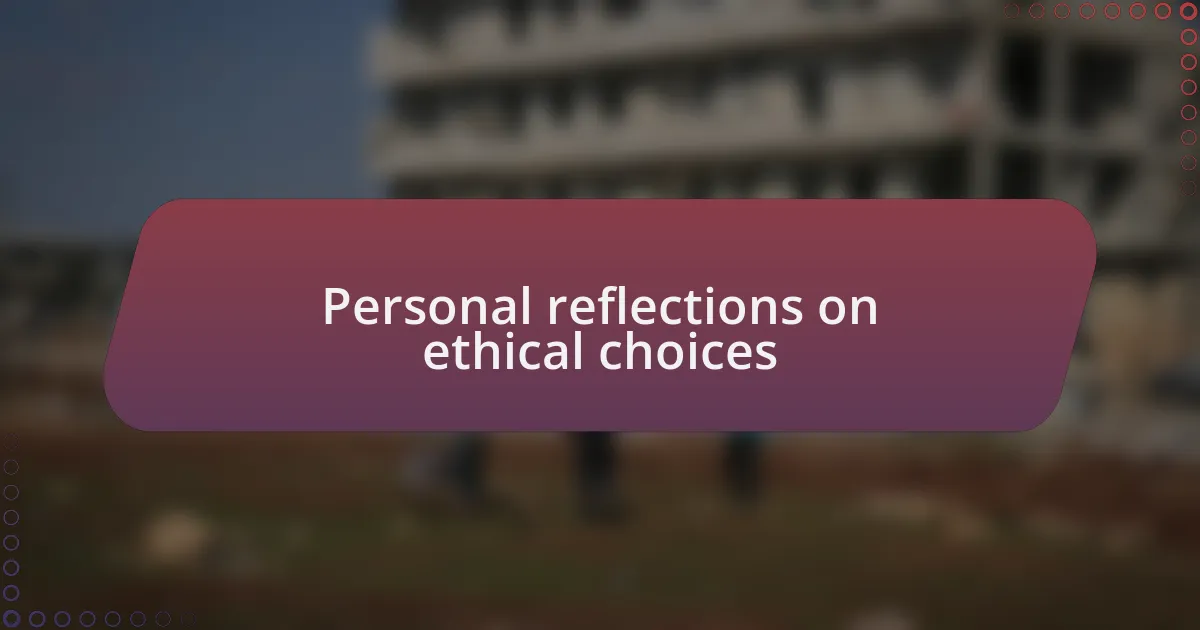
Personal reflections on ethical choices
I often find myself grappling with ethical choices in complex environments, and one moment stands out vividly. During a community rebuilding project, I was torn between adhering strictly to budget constraints and addressing a critical yet unplanned need for safe housing. I remember the anxious faces of families waiting for assistance, and it struck me: my decision was about more than the numbers—it was about human lives. This experience taught me that sometimes the right choice isn’t the easiest one.
Reflecting on my own ethical journey, I recall a point where I had to make a tough call involving resource allocation. I decided to prioritize a marginalized group, despite knowing it might cause tensions with other stakeholders. I felt a wave of discomfort, but there was a sense of conviction that accompanied it. I asked myself, “What kind of leader do I want to be?” That question pushed me to embrace decisions aligned with my values, even in the face of potential backlash.
Each ethical choice I make seems to carry its own weight, as if it builds upon the last. There’ve been times when I’ve backtracked after realizing that my decisions didn’t consider all viewpoints. An instance where I misjudged the community’s sentiment left me feeling uneasy. But through that discomfort, I learned that ethical decision-making isn’t just about the choices you make; it’s about the continuous journey of reflection and growth. Have you considered how your past choices have influenced the way you navigate ethics today? Reflecting on this can often reveal profound insights about our personal values and decision-making styles.
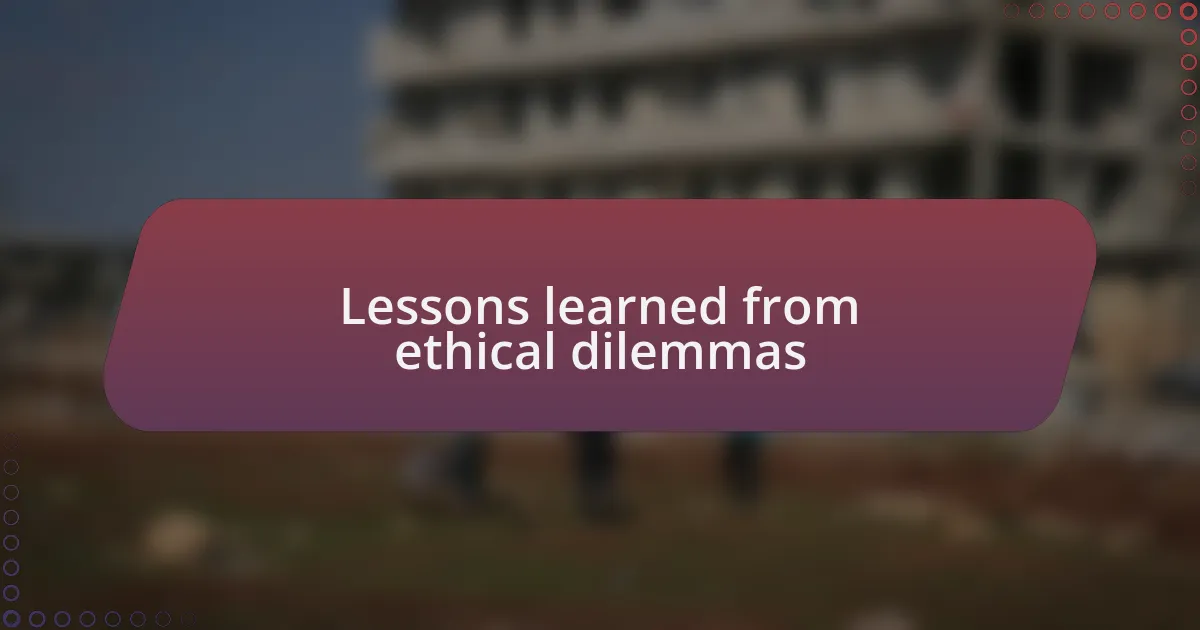
Lessons learned from ethical dilemmas
I’ve encountered numerous situations where ethical dilemmas led to unexpected lessons. In one instance, I was part of a committee deciding on the distribution of aid. After a heated discussion, we had to consider how our choices impacted not just the recipients but also our own team dynamics. It struck me that navigating ethical dilemmas isn’t a solitary affair; it’s a collective journey where listening to diverse perspectives can reveal the best path forward. Have you ever felt that the opinions of others shaped your own understanding of fairness?
Throughout my experiences, I realized that ethical dilemmas often force us to confront uncomfortable truths about ourselves. On one project, I had to address the implications of prioritizing immediate needs over long-term sustainability. The push and pull of these considerations left me emotionally drained. Yet, I found clarity in one crucial lesson: understanding my own biases is essential in making fair decisions. How do you usually process your emotional reactions when faced with tough choices?
The aftermath of ethical dilemmas often teaches resilience and adaptability. I remember a time when a decision I made to assist a particular sector of the community was met with backlash. Initially, the criticism stung, but it sparked a deep reflection on what it means to serve a community effectively. I learned that ethical decision-making isn’t just about righting a wrong but also about learning to adapt, reassess, and grow from the experience. Are you open to evolving your perspective after encountering criticism in your decisions?